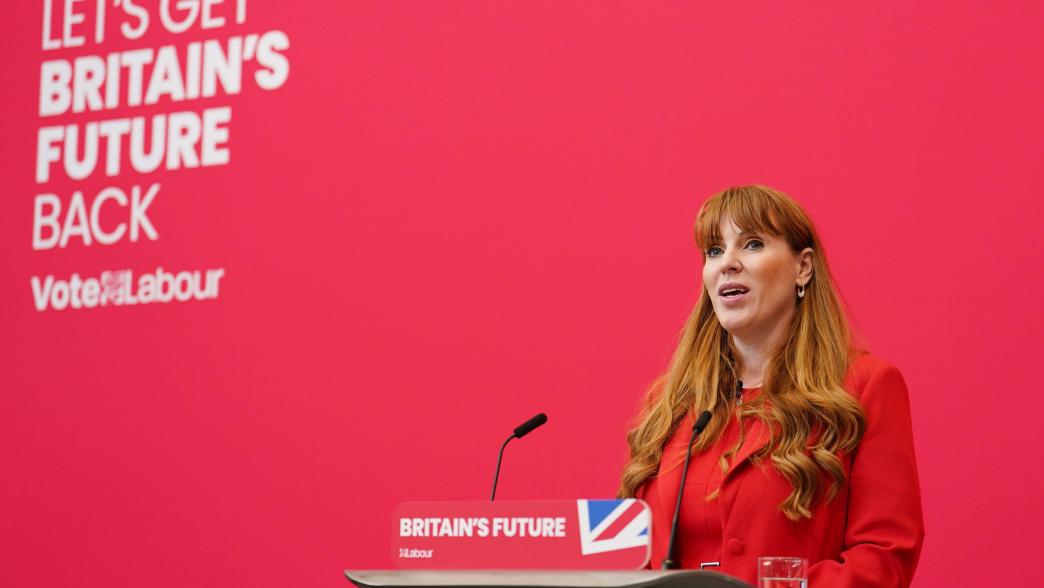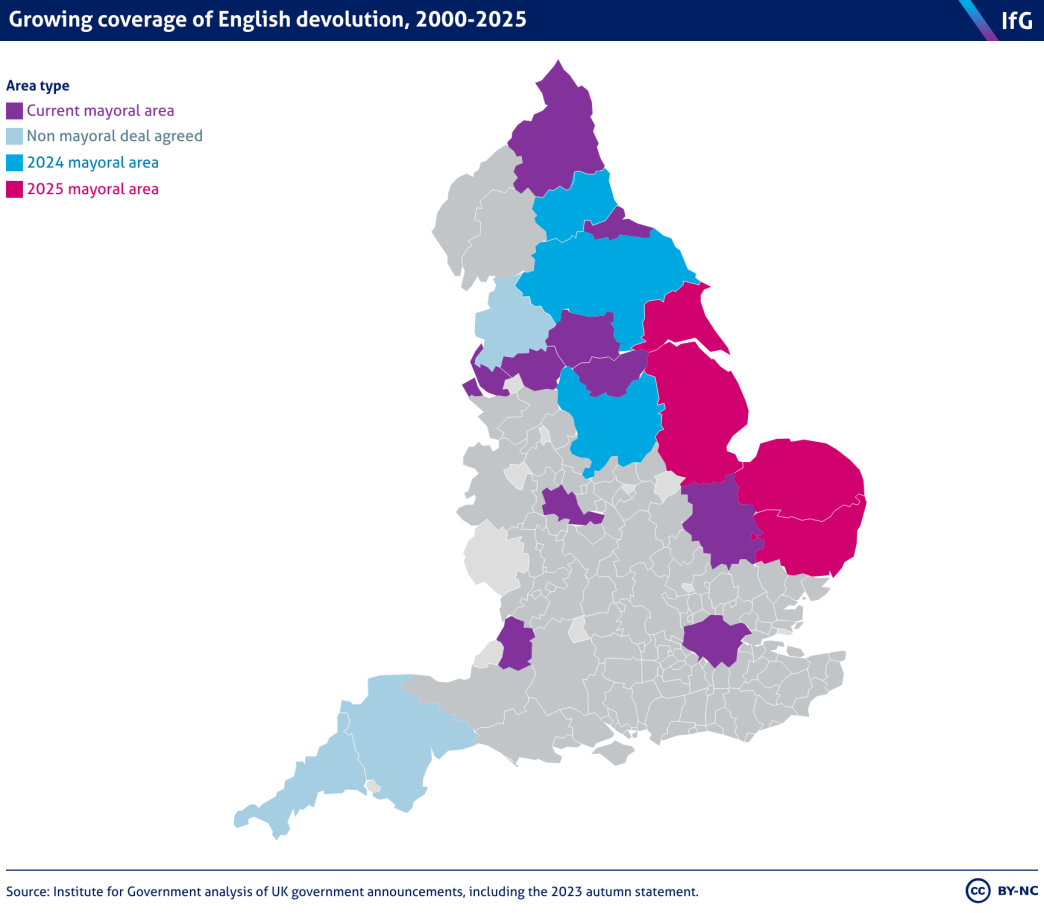A Labour government would need to take big decisions to deliver on its devolution agenda
Do Keir Starmer’s and Angela Rayner’s devolution plans add up?

Labour’s plans to both broaden and deepen English devolution are welcome and would help it meet its missions in government. Thomas Pope argues that key decisions will need to be made about how power would be devolved in practice
On Thursday 28 March Keir Starmer and Angela Rayner launched Labour’s local election campaign, ahead of the local elections on 2 May. Announcements included fresh commitments to broaden and deepen devolution in England, building on the mayors and combined authorities that have been established in the past decade. The plans published as part of the campaign launch 4 https://labour.org.uk/updates/stories/labours-plan-to-power-up-britain/ are the clearest statement yet of how a Labour government would look to take this agenda forward. They include ambitious proposals to broaden and deepen devolution, and to improve the working relationship between local government and Whitehall.
We welcome these proposals, which align closely with the Institute for Government’s own recommendations – set out in our working paper published earlier this month – for how the next government should look to complete the job of English devolution. If implemented, England would be well set up to boost growth both in underperforming regions and nationally. However, there are still key decisions to make and trade-offs to navigate if Labour is to realise this vision in government.
There is lots to welcome in Labour’s devolution plans
Labour’s plans rightly recognise the importance of spreading devolution further across the country. Currently, only around half of England is covered by combined authorities, an intermediate tier of government above local authorities that are at the right scale to take on key economic policy levers like transport and skills. As we have argued, completing the map of English devolution is important from a fairness perspective: places with mayors have seen a benefit that places without combined authorities have missed out on. It is also key for government more broadly to work well. A patchwork map is difficult for Whitehall officials to navigate and frustrates good policy making.
Importantly, there are also plans to deepen devolution for existing mayors. Driving Labour’s growth mission, the underpinning rationale for these proposals, will require stronger economic growth in underperforming cities outside London, which is more likely if mayors have the right powers. The additional levers Labour proposes to give to mayors, such as greater control over employment support and planning, match our recommendations. The focus on simpler funding is also welcome: funding models are often as important as the powers devolved to drive growth.
Labour’s plans also emphasise the need for clear strategy, both at the local level through new local growth plans and at the national level through industrial strategy. And it proposes improvements to how the centre can work with mayors and other local leaders. As past IfG research has noted, a clear strategy driven from the centre, with a plan that incorporates the role of local government, is crucial if a government wants to tackle longstanding regional inequalities and make devolution work well.
The plans go with the grain of the current government’s devolution agenda
Labour’s proposals are not a radical departure from the current government’s plans. Starmer explicitly praised the Levelling Up the United Kingdom white paper, launched during Boris Johnson’s premiership, for getting much of its diagnosis right. And there is little in these plans that levelling up secretary Michael Gove would disagree with: the government has a mission for every area in England that wants a devolution deal to get one by 2030, and is also committed to simplifying funding and agreeing deeper devolution deals with existing combined authorities.

This proposed continuity should be applauded. Too often regional policy has been undermined by excessive churn as governments have ripped up the plans and institutions of their predecessor. For example, in 2010 the coalition government scrapped New Labour’s regional development agencies. If Labour forms the next government, building on the success of combined authorities and mayors will allow it to make more progress and increases its chances of success.
At the same time, there are differences between the government’s and Labour’s plans. Labour’s rhetoric at least indicates it would look to go faster than the Sunak administration, especially on simplifying funding. And the focus on national strategy – linked to local strategy, with a clear coordination plan – is a notable gap in the current government’s approach.
A Labour government would need to navigate key trade-offs to make this work in practice
Understandably, Labour’s plans do not yet represent a comprehensive programme for devolution in government. But there are several key decisions that Labour will need to make on how it will implement these proposals. In several cases, this may require bold choices that are unpopular with some people.
First, to complete the devolution map Labour has focused on asking every part of the country without a deal to propose one, working together at sensible geographies. This is understandable, and our research shows that a clear local vision is a key component of successful deals. However, local agreement will not lead to a complete map. In some areas, there are competing views of the correct geography, and small areas risk being left out if decisions are all made from the bottom up. Labour will need to decide how and when it intervenes to ensure the map makes sense overall. We have proposed that the next government should set out the boundaries of a complete map within three years, starting with deals in the remaining big urban areas that have been left out so far. Labour rightly recognises this as key to improving regional productivity performance.
Second, Labour’s document often refers to local leaders and mayors, but it has not yet said explicitly whether the adoption of a mayor or other directly elected leader will be a condition for devolution, or what powers will be available without one. This has been a barrier to doing some deals in the past.
Finally, Labour lays out plans for mayors and combined authorities to have responsibilities making key decisions in areas like planning. Some of these decisions will be contentious. And as it stands, mayors are in a relatively weak constitutional position with unanimity or two-third majorities among local authorities often required. As combined authorities take on more power, Labour should review and reform combined authority governance to streamline decision making and remove unnecessary roadblocks and veto points.
Labour’s plans for devolution are on the right track. If it forms the next government, it will need to make tough choices to ensure the governance of England is set up to deliver on its missions.
- Political party
- Labour
- Public figures
- Keir Starmer Angela Rayner
- Publisher
- Institute for Government